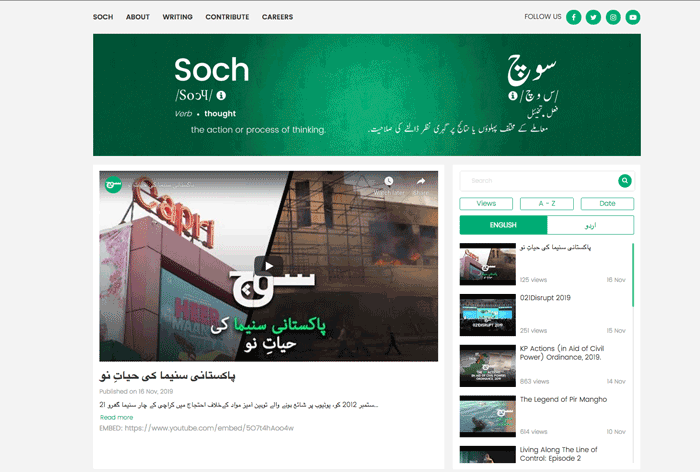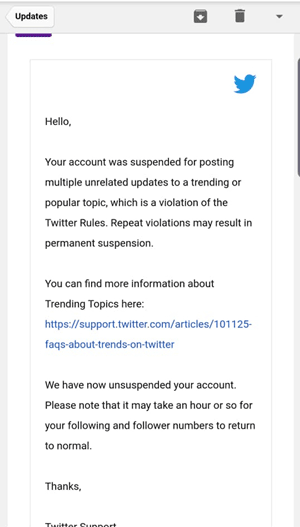Righting Wrong
A few years back, a smattering of 50-second clips with breaking news of the hour relayed in the form of neon text, a dramatic musical score and stock film reel was enough to capture and retain the attention of users across social media platforms. Today, with the massive influx of information constantly flooding newsfeeds people are always looking for credible sources of authentic, engaging news. Soch is a venture that began with the intent to educate and interact with the Pakistani masses to galvanise them into thinking critically about pressing issues.

| sochvideos.com
Launching with SochVideos on Facebook December 3, 2017, the page has steadily gained interest over the past two years to the loyal following of 380,000, and counting, SochVideos launched a website specifically for its videos in September 2018, and then another, SochWriting, for long form pieces in May 2019. The videos are tongue-in-cheek commentaries on current Pakistani affairs and social issues backed by thoroughly researched reports, while SochWriting publishes long form pieces on long-standing issues in Pakistani society. Co-founders Sofyan Sultan and Arafat Mazhar care deeply about changing the narrative of Pakistani news to create a model that follows journalistic integrity and ethics while generating captivating content. With newer equipment and programmes that allow a skilled and enthusiastic team to capture and edit cinematic sweeping shots, Soch is determined to create visually engaging and thought provoking documentary serials.
And it’s working — younger audiences who have stopped watching local news channels and cable television are getting a majority of their news from social media outlets or on their phones. And while local news channels try to integrate social media into the format of their shows, they cannot adjust the production value or style of the show to follow more current tech trends. And so, the youth-based demographics turn to their Twitter, Facebook and Instagram feeds.
Media outlets are now scrambling to capitalise on the growing viewers on social media, plugging ads for fashion boutiques and carbonated drinks in between videos of breaking news.
Further monetisation of content has led to native advertising, where paid articles featuring products, services and businesses are written about and posted to the websites of the news/media agencies. This change in influx of news and content has grabbed the attention of state actors, who in turn, influence social media to suit their interests.
Traditionally, ‘shadowbanning’ in the online world has been limiting posts of a user to only be seen by the user, and that it cannot be found in search or by a hashtag. It rose to prominence on social media forum Reddit, where it was used to combat spam posts (posts with repetitive/pointless content). It is used now by most social media platforms to drown certain posts that flag keywords and topics that are marked as inappropriate by the platforms.

The warning issued to Soch’s suspended Twitter account.
Twitter, specifically, uses an algorithm to determine how often an account is reported, how frequently it uses flagged keywords and the ratio of replies to tweets by the account to determine its authenticity. Based on the information the algorithm compiles, Twitter will devalue an account in searches, hashtags, and replies, essentially, ‘shadowbanning’ it. Instagram and Facebook, have started following suit in this evolution in censorship.
As Soch attempts to report on the unfiltered, unbiased truth of Pakistan’s current state of affairs to its citizens, it has begun to feel the creeping censorship.
“We recently shot a documentary series on Soch’s journey along the Line of Control (LoC),” said Sualeha Qureshi, Creative Director and Head of Production at Soch. In an unprecedented move from a Pakistani news agency, Soch also managed to accumulate videos from the natives and residents in the cordoned off Indian-occupied Kashmir, and incorporated it into a separate video series, Kashmiri Voices, which showcases the voices from Indian-Occupied Kashmir, while keeping their identities anonymous.
“We are the only Pakistani news reportage site to collect interviews from the natives who personally experienced the shutdown,” says Sualeha.
They initially interviewed Gregory Stanton, a former Research Professor in Genocide Studies and Prevention, to help explain the genocide alert for the region, but ultimately decided to venture to the LoC.“We found it imperative to share the stories of the people of Pakistan administered Kashmir. In this region the Soch team; met with victims (as young as three years old) of cross border shelling, Muslims who fled IoK because of the torture they experienced due to their faith and third generation Azaad Kashmiris who spend their nights living in bunkers, trying to survive to live another day in a conflict they wanted no part of.“
The team spent six days traversing from the north of the LOC to the south, detailed in the first episode of the documentary series. The second episode follows the lives of the refugees from Indian-Occupied Kashmir.
“When we posted on it, we noticed our tweets and posts were being taken down. They’ve blocked Soch content in India and USA. We’d only seen this happen twice before — when we made a video on the US and Afghan Peace talks, and when we posted a video on the BJP.” The video has a limited organic reach, and has not been approved for boosting or advertising on the respective social media platforms.
“We have since buckled down on the data analysis of different groups and demographics to see where our reach extends to, and if our targeted audiences are able to view the content at all,” says Sualeha. Even the Soch team’s enthusiasm and commitment to sharing the truth is simply not enough to get the news across.
Nevertheless, the dedicated powerhouse of a director and her team of reporters, editors and cinematographers do their best to ensure whatever content Soch creates is uniform in its calibre, accessibility and unbiased reporting. The news is the news. In reporting with longevity, as opposed to breaking or current news, Soch‘s team attempts to delve into the root of the problem, instead of getting swept away by the consistent onslaught of complaints, or a mob-mentality narrative. Soch engages with the viewers by asking them questions, holding online polls and inviting discussions on social media. And the risk pays off for those who do indeed get to view and interact with the news agency. People have graduated to watching their 30-minute episode series, and following their work. Evidently, even with ‘higher powers’ in the form of fiddly search engines, inconsistent algorithms and extraneous social networking moderators trying to shut their work down, Soch’s voice continues to emerge victorious.



